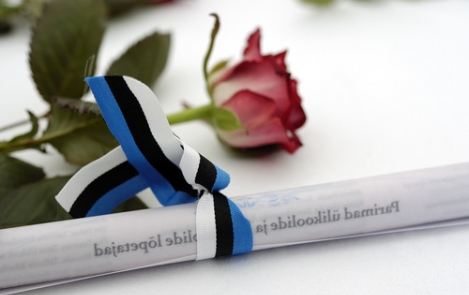-
Reset
+


President of the Republic at a reception honouring the best graduates
22.06.2010
Discourse on the new educational system and on the administration of universities attests to the fact that the topic is extremely important for society. Estonia’s success hangs in the balance, and it may even be a question of the survival of the nation.
Dear top students,
Every June, right before St John’s Day, I tell everyone in attendance here that they are the best. I say the same thing to you here today: you are Estonia’s finest. At least going by educational statistics, Estonia ranks fairly high in Europe and the entire world, and so I can say with confidence that you are also among the best and brightest anywhere.
But let’s not get caught up in too much self-admiration. After all, we know fairly well why you are the best and brightest. What is more important is what conclusions you can draw from being at the top of your class? What kinds of opportunities, what kinds of obligations? What responsibility does the best in their field have?
For one thing, all roads in the free world are open to the best and brightest. Estonia is free and fairly mature as a state, but certainly it is not yet capable of offering the absolute finest in every field. This goes for education and science as well. What this means is that studying and working elsewhere can seem very enticing. Still, we should ask when is going abroad temporary and when is it permanent – we all know how life happens while making other plans.
Every decision has a price. If we thirst for better knowledge, we may have to travel to the ends of the earth to obtain it, but we must remember that we cannot take our living environment and its denizens with us. We can take our memories and knowledge of the current state of things. I understand that for young people, this is just theoretical talk. Older people on the other hand know from their own experience that the most valuable relationships, the closest friendships – the ones that last life-long – are formed in youth, in school and university days.
Studying abroad has at least as much to commend it. The tribulations of educational reform in Estonia are no secret to anyone, certainly not to you, our best students. The system might even be said to be suffering from disorientation, we read the distress signals in the press every day. You are all well-aware of the shortcomings of our upper secondary school and university system. Of course, your immediate experience does not necessarily mean you know how to do things better and more properly in future. It is altogether possible that not everything we need has been invented yet in the rest of the world.
Certainly the rest of the world can offer us different experiences, and different ways of doing things. By bringing them home and adapting them to Estonian circumstances, many rewards can be reaped with little effort.
As I noted, our state and its basic structure are largely completed. Our main issues in state-building now come down to whether the bedroom wallpaper should be pink or blue, not whether the foundation of the government should be built of stones or sandbags.
Estonia’s security problems are, by and large, solved. The future of Estonia and the national consciousness, the future of our culture, is decided in Estonia’s schools, from the youngest to oldest levels. This is wisdom we have known for centuries, since the time of Forselius. The founders of the republic knew that there is no task more important than establishing Estonian-language university education. All of our effort and talent was marshalled for this task, yet we did not shrink from calling on our Nordic neighbours for additional resources and skills.
But what is our situation now, my dear friends?
The process of moulding our school and university system is still in progress. The discourse on the new general educational system and on the administration of universities attests to the fact that the topic is extremely important for society. I would go even further – Estonia’s success hangs in the balance, and it may even be a question of the survival of the nation.
The business of adapting and calibrating the educational system is a task only for those who have first-hand experience of the shortcomings of the existing system and who have knowledge from elsewhere about systems that work better. Who else should build the educational system if not the smartest, brightest and most conscientious among us?
If anyone here today still isn’t sure who they want to grow up to be, and wants to hear my advice, here it is: the most exciting and challenging work that will be done in Estonia in the decades ahead will take place in the educational system. Today more and more people are seeing the value of this work, and the best workers will be needed to accomplish it. The work involves teaching, training teachers and passing on knowledge in the broadest sense. It is work that can be learned abroad – but must be done here in Estonia.
We must desire, dream and hope that now someone at a ceremony here 25 years from now might say: the Estonian educational system is the best in the world thanks to the fact that in 2010, a sudden shift occurred in the career preferences of young Estonians. It was then that the best and brightest at schools and universities began favouring careers in academia and as educators to the popular professions of yesteryear.
I wish you the fortitude needed to make it happen. Thank you for what you have done so far. Don’t forget that it is just the beginning.
Thank you.




